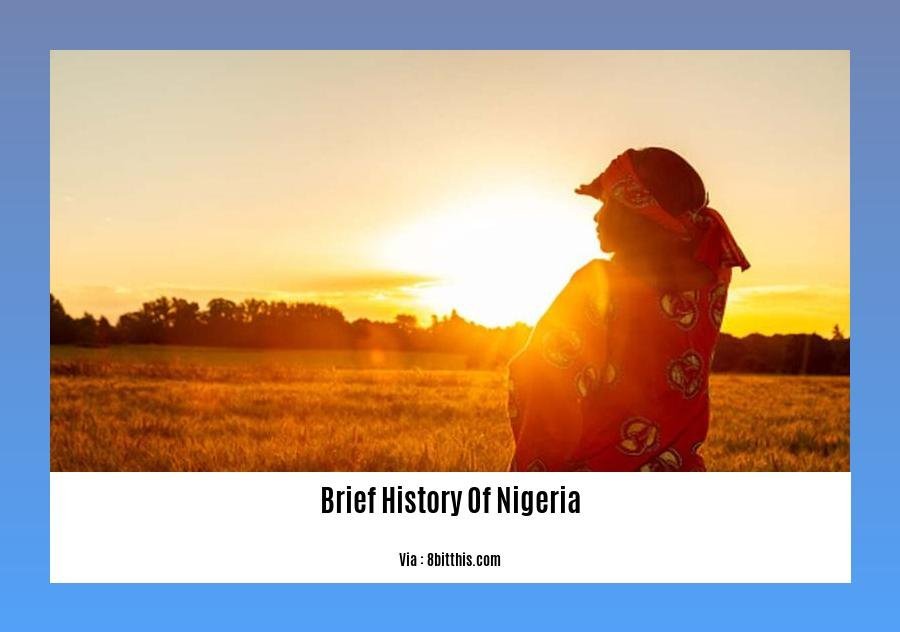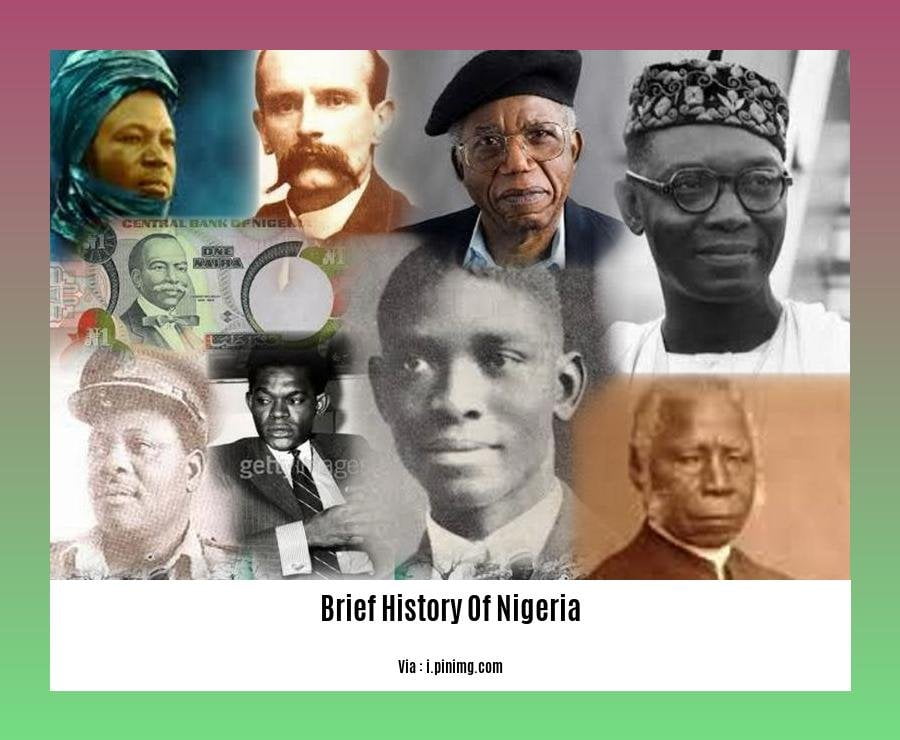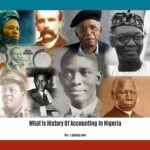Embark on a journey through time as we delve into the captivating history of Nigeria, a nation blessed with a rich tapestry of cultures and traditions. Join us as we explore the intricate details that have shaped this vibrant nation, from its pre-colonial roots to the challenges and triumphs of the present day. [A Historian’s Perspective: Exploring Nigeria’s Rich Past – A Brief History of Nigeria] promises to be an enlightening adventure into the heart of Africa’s most populous country.
Key Takeaways:
- Nigeria’s history dates back to 1100 BC, with its early settlers trading across the Middle East and Africa.
- Nigeria became a hub for the slave trade in the 15th century and was later colonized by Britain in the 19th century.
- Nigeria gained independence in 1960 and became a republic in 1963.
- Since independence, Nigeria has experienced a civil war, military dictatorships, and democratic governments.
- Nigeria is Africa’s most populous nation with over 250 diverse ethnic groups.
- Nigeria is a major oil producer with a substantial economy.
- Nigeria faces challenges such as poverty, corruption, and security concerns.
A Brief History of Nigeria

Nigeria, a vibrant tapestry of diverse cultures and rich historical heritage, has captivated the imaginations of historians and scholars for centuries. Its journey, marked by trials, triumphs, and a relentless pursuit of unity, stands as a testament to the resilience and determination of its people.
Early History and the Dawn of Civilization
The earliest evidence of human habitation in Nigeria dates back to 1100 BC, with settlers engaging in trade across the Middle East and Africa. Over time, distinct civilizations emerged, each contributing to the country’s cultural mosaic. The Nok civilization, renowned for its intricate terracotta sculptures, flourished in the central region, while the Igbo civilization, known for its sophisticated political and economic systems, thrived in the southeast.
The Transatlantic Slave Trade and Colonial Rule
In the 15th century, Nigeria became a major hub of the transatlantic slave trade, a dark chapter in its history that left an enduring impact. European powers, driven by greed and the pursuit of wealth, established trading posts along the coast, forcibly removing millions of Africans from their homeland. The consequences of this inhumane practice reverberate to this day.
British influence grew steadily, culminating in the colonization of Nigeria in the 19th century. The imposition of colonial rule brought about significant changes, including the introduction of Western education, infrastructure development, and the establishment of administrative structures. However, it also led to the suppression of indigenous cultures and the exploitation of resources for the benefit of the colonizers.
Independence and the Struggle for Unity
The struggle for independence gained momentum in the mid-20th century, led by visionary leaders who yearned for self-determination and the restoration of Nigerian sovereignty. After years of peaceful resistance and negotiations, Nigeria finally achieved its independence on October 1, 1960, marking a pivotal moment in its history.
Despite the euphoria of independence, the newly formed nation faced numerous challenges. The task of uniting over 250 ethnic groups, each with its unique language, culture, and traditions, proved daunting. Political instability, ethnic tensions, and economic disparities plagued the country, leading to a civil war from 1967 to 1970.
The Post-Civil War Era and the Quest for Democracy
The end of the civil war ushered in a period of reconstruction and reconciliation. Military governments ruled Nigeria for several decades, implementing policies aimed at promoting economic development and national unity. However, concerns about human rights abuses and the lack of democratic governance persisted.
In the late 1980s, a pro-democracy movement emerged, demanding an end to military rule and the establishment of a democratic system. This culminated in the 1999 presidential election, which marked the return to civilian rule. Since then, Nigeria has experienced several democratic transitions, although challenges such as corruption, terrorism, and poverty remain.
Nigeria Today: A Vibrant Nation with a Promising Future
Contemporary Nigeria stands as a vibrant and dynamic nation, brimming with potential. Its population, the largest in Africa, is a testament to its diversity and cultural richness. The country is endowed with abundant natural resources, including oil and gas, which have fueled economic growth in recent decades.
Despite the challenges it faces, Nigeria remains a beacon of hope and opportunity. The resilience and determination of its people, coupled with its vast resources and youthful population, position it for a bright future. As Nigeria continues to navigate its path forward, it draws inspiration from its rich history and the unwavering spirit of its citizens. The country’s journey is far from over, and the chapters that lie ahead promise to be filled with both triumphs and tribulations. Yet, one thing is certain: Nigeria’s story is one of resilience, unity, and the relentless pursuit of progress.
Did you know that Ballroom Dance has an intriguing journey throughout the ages? Delve into the Brief History of Ballroom Dance to unravel its fascinating story.
Ever wondered how English literature evolved over the centuries? Take a captivating journey through the Brief History of English Literature and discover its rich legacy.
From ancient rhythms to modern melodies, music has a captivating history. Explore the evolution of sound in the Brief History of Music and uncover the stories behind your favorite tunes.
Struggle for Independence: Nigerians Resisted Colonial Rule and Fought for Independence, Which Was Eventually Achieved in 1960

Imagine a nation teeming with vibrant cultures, a melting pot of ethnicities, and a past etched with both pride and struggle. This is Nigeria, a country that has risen from the throes of colonialism, forging its own path towards self-governance and national identity.
The Glimmer of Freedom: A New Generation Emerges
As the winds of change swept across the African continent in the 1930s, a new generation of Nigerians emerged, fueled by a burning desire for self-determination. They were the torchbearers of freedom, challenging the colonial yoke that had long stifled their aspirations.
The Birth of Nationalist Movements: A United Front Against Colonialism
Across the country, nationalist movements sprang up like wildfires, uniting Nigerians from all walks of life. They rallied under a common banner, demanding greater political participation and an end to colonial rule.
The Power of Unity: A Shared Vision for Independence
Despite their diverse backgrounds, the Nigerian people stood shoulder to shoulder, transcending ethnic and regional divides. They recognized that their strength lay in unity, and together, they fought for the liberation of their beloved nation.
The Road to Independence: A Long and Winding Path
The journey towards independence was not without its trials and tribulations. Nigerians faced fierce resistance from the colonial authorities, who were determined to maintain their grip on power. But the spirit of resilience and determination burned bright within the hearts of the Nigerian people.
The Dawn of a New Era: Independence Achieved
On October 1, 1960, Nigeria’s long-awaited dream of independence was finally realized. The Union Jack was lowered, and the green-and-white flag of Nigeria was raised high, symbolizing a new era of self-governance and national pride.
Key Takeaways:
- Colonial Exploitation:
Forced labor and limited political participation were hallmarks of colonial rule.
Nationalist Resistance:
A new generation of activists emerged, demanding greater involvement in governance.
Unity in Diversity:
Nigerians from diverse backgrounds united against colonial rule.
Triumph Over Adversity:
- Despite challenges, Nigeria achieved independence in 1960.
Sources:
- The Nigerian Struggle for Independence
- Nationalist Movements and Independence, 1929-1960
Challenges of Nation-Building: After independence, Nigeria faced the challenges of nation-building, including ethnic conflicts, economic development, and political stability.
Nigeria, a nation brimming with cultural diversity and abundant natural resources, has confronted and grappled with formidable challenges in its quest to forge a unified national identity.
Key Takeaways:
Ethnic Conflicts: The tapestry of Nigeria’s diverse ethnic groups, each with unique languages, customs, and traditions, has posed challenges to fostering unity and peaceful cohabitation. Competition for resources, political power, and perceptions of marginalization have fueled ethnic tensions and conflicts, hindering the nation’s progress.
Economic Development: Despite its wealth in natural resources, Nigeria has faced obstacles in translating this potential into sustainable economic development. Inadequate infrastructure, corruption, and lack of diversification have hampered economic growth and prevented equitable distribution of wealth.
Political Stability: Nigeria’s journey toward political stability has been fraught with challenges, including military rule, political instability, and electoral irregularities. The establishment of democratic institutions has been a work in progress, with issues such as corruption and lack of accountability persisting.
The Lingering Impact of Colonialism
Nigeria, like many African nations, bears the legacy of colonialism, which has left an enduring impact on its boundaries, ethnic relations, and political systems. The arbitrary demarcation of borders during the colonial period resulted in the merging of diverse ethnic groups, creating potential fault lines and fueling tensions.
Addressing the Challenges
To overcome these challenges, Nigeria has undertaken various initiatives and strategies, including:
Constitutional Reforms: The adoption of a federal system of government was intended to accommodate the diverse interests of the country’s ethnic groups. However, the distribution of power and resources among the states has remained a contentious issue.
Economic Reforms: The government has implemented economic reforms aimed at diversifying the economy, reducing corruption, and attracting foreign investment. These efforts have yielded mixed results, with corruption still posing a significant obstacle to economic progress.
National Unity Programs: Initiatives such as the National Youth Service Corps, designed to promote inter-ethnic interaction and understanding, have been implemented to foster a sense of national unity.
Peace and Reconciliation Efforts: The establishment of peace commissions and the promotion of dialogue and mediation have been crucial in addressing ethnic conflicts and promoting reconciliation.
Strengthening Democratic Institutions: Efforts to strengthen democratic institutions, enhance electoral integrity, and promote accountability have been ongoing, although challenges remain in ensuring the credibility and transparency of electoral processes.
Conclusion
The challenges of nation-building in Nigeria are complex and multifaceted, requiring a concerted and collaborative effort to find lasting solutions. Addressing ethnic conflicts, promoting economic development, and ensuring political stability are crucial steps toward creating a more cohesive and prosperous nation. The journey may be arduous, but Nigeria’s rich cultural heritage and the resilience of its people provide a foundation for a brighter future.
Relevant Sources:
- The Challenges of Nation-Building in Nigeria and the State-Building Process
- The Problems of Nation Building in Nigeria
Contemporary Nigerian Society: Nigeria today is a vibrant and diverse nation, grappling with issues such as poverty, inequality, and security, while also striving for economic growth and development.
In modern-day Nigeria, a vibrant tapestry of diverse cultures, ethnicities, and traditions is interwoven with a complex array of challenges and opportunities. Nigeria today is a vibrant and diverse nation, grappling with issues such as poverty, inequality, and security, while also striving for economic growth and development.
Issues Contemporary Nigerian Society Faces
- Poverty and Inequality:
- Despite abundant natural resources, poverty affects millions of Nigerians.
Economic inequality persists, with a significant wealth gap.
Security:
- The country faces security challenges, including terrorism, banditry, and communal conflicts.
A climate of fear and insecurity hampers development efforts.
Economic Development:
- Nigeria seeks to diversify its economy beyond oil and gas.
Unemployment, especially among the youth, is a major concern.
Nation-Building:
- Balancing diverse ethnic, religious, and cultural identities is essential for unity and progress.
- Building a sense of national identity is an ongoing challenge.
Key Takeaways:
- Nigeria is a diverse nation with a rich cultural heritage.
- Poverty and inequality remain significant challenges.
- Security concerns hinder development and stability.
- Economic diversification is crucial for sustainable growth.
- Nation-building efforts aim to foster unity and progress.
Overcoming the Challenges:
- Poverty Alleviation:
- Investing in education, healthcare, and job creation.
- Promoting inclusive economic policies.
Addressing corruption and improving governance.
Security and Stability:
- Strengthening law enforcement and security agencies.
- Promoting dialogue and reconciliation among communities.
Tackling the root causes of conflict.
Economic Growth and Diversification:
- Investing in infrastructure, agriculture, and manufacturing.
- Encouraging foreign investment and promoting local entrepreneurship.
Leveraging technology for economic transformation.
Nation-Building:
- Promoting national unity through education, arts, and culture.
- Ensuring equal rights and opportunities for all citizens.
- Fostering a sense of shared purpose and identity.
The Future of Nigeria:
Nigeria’s future holds both challenges and opportunities. With its vibrant population, rich resources, and potential for economic growth, Nigeria has the potential to become a regional powerhouse. However, addressing the challenges of poverty, inequality, security, and nation-building is essential to unlocking this potential. By investing in its people, promoting inclusive development, and fostering unity, Nigeria can emerge as a beacon of progress and prosperity in Africa.
Relevant Sources:
- Challenges of Nation-Building in Nigeria
- Building a Better Nigeria: The Challenges of Economic Development and Poverty Reduction
FAQ
Q1: When did Nigeria gain independence from British colonial rule?
A1: Nigeria gained its independence from Britain on October 1, 1960.
Q2: What system of government did Nigeria adopt after independence?
A2: Nigeria adopted a federal system of government after independence, with a strong central government and autonomous regional governments.
Q3: What were some of the challenges that Nigeria faced after independence?
A3: Nigeria faced a number of challenges after independence, including ethnic tensions, political instability, and economic difficulties.
Q4: What is the significance of Nigeria’s oil wealth?
A4: Nigeria’s oil wealth has been a major source of revenue for the government and has played a significant role in the country’s economy. However, it has also been a source of conflict and corruption.
Q5: What are the prospects for Nigeria’s future?
A5: Nigeria’s future is uncertain, but the country has the potential to be a major economic and political power in Africa. However, it will need to overcome its current challenges, including poverty, corruption, and insecurity, in order to achieve its full potential.
















